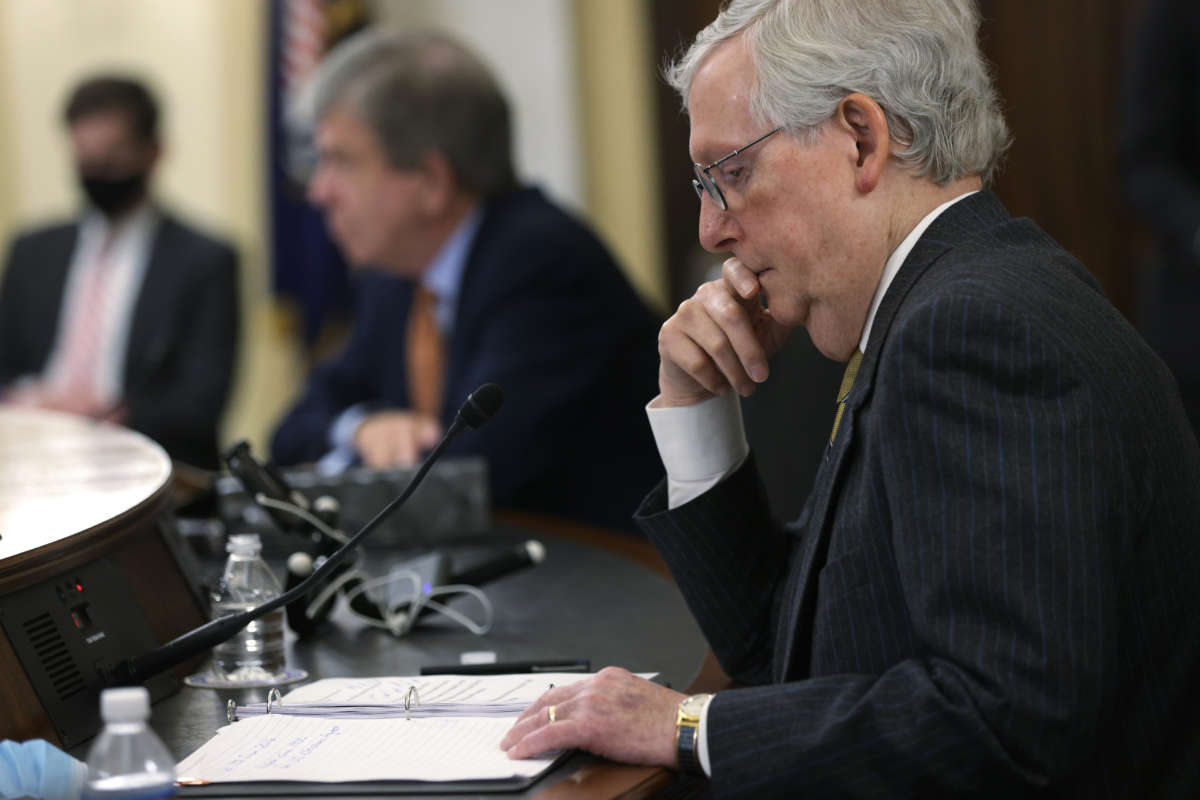Republicans are concerned that the Democrats’ voting rights bill is too popular, according to a leaked call between a senior policy adviser to Senate Minority Leader Mitch McConnell (R-Kentucky) and members of prominent conservative groups.
In a recording of the call obtained by The New Yorker, conservative political operatives were upset that H.R. 1. — known as the For the People Act and, recently, S. 1 — has wide bipartisan support. They particularly took issue with provisions within the bill that would require disclosure of dark money donors, which they think could harm Republicans in particular.
Kyle McKenzie, research director for the Koch brothers-backed Stand Together, said that, “the most worrisome part” about the wide support for the bill “is that conservatives were actually as supportive as the general public was when they read the neutral description,” according to The New Yorker’s Jane Mayer report. Instead, McKenzie recommended Republicans focus on killing the bill within Congress because it’s “incredibly difficult” to sway voters against it.
The message that the legislation fought back against the influence of billionaire donors was especially hard to campaign against, the Republican operatives found. “Not even attaching the phrase ‘cancel culture’ to the bill, by portraying it as silencing conservative voices, had worked,” Mayer wrote. The Koch-affiliated organization has invested “substantial resources” into honing conservatives’ message on the bill.
The only messaging that Stand Together was able to find that worked was based on disinformation. McKenzie said that, if they told voters that the American Civil Liberties Union (ACLU) and Planned Parenthood were against the legislation, they could sway them the Republicans’ way. But the ACLU only opposes part of the legislation, and Planned Parenthood is in full support of it, The New Yorker reported.
Steve Donaldson, a senior policy adviser to McConnell, noted the minority leader’s concern about how the provisions to increase donor transparency in the For the People Act would affect his fundraising efforts. “When it comes to donor privacy, I can’t stress enough how quickly things could get out of hand,” Donaldson said in the call.
Nick Surgey, executive director of the watchdog group Documented, told The New Yorker that, while it tracks that McConnell might oppose H.R. 1 for this purpose, it’s still strange to see this amount of coordination between his staff and technically nonpartisan groups on the call.
Currently, an organization or individual with an interest in influencing politics can use dark money channels enabled in part by things like 2010’s Citizens United. Big money donors can take their donations — potentially while being bankrolled by or affiliated with large corporations — to nonprofit organizations that can then donate to politicians and their political action committees. The For the People Act seeks to make those donations public, making it easier to trace and track where campaign money is coming from.
H.R. 1 has the backing of every Democrat in the House, which passed the bill earlier this month. Polling on H.R. 1 back when it was first introduced in 2019 and from earlier this year shows that the bill is popular across a majority of Democrats, Republicans and independents.
The nearly 800-page bill seeks to end the influence of dark money on politics by requiring more thorough political donation disclosures and makes it easier to register to and cast a vote. It attempts to generally fix democracy, which House Speaker Nancy Pelosi (D-California) has noted is in “deep disrepair” in the country.
It’s been clear for months that Republicans are vehemently opposed to the bill. They’ve launched misinformation campaigns against it and called it “anti-democratic.” But they just can’t figure out how to get people to dislike the bill as much as they do.
Influencing politicians through dark money is a tactic favored by groups like the fossil fuel industry. Billionaire Charles Koch and his late brother in particular were instrumental in constructing far-reaching dark money networks across the country.
Out of the top 10 dark money groups that have spent the most since 2008, nine are conservative or right-leaning, according to a list compiled by OpenSecrets. While both parties benefit from dark money groups, only Democrats are trying to end their influence.
Republicans have been working for months to make it harder to vote ever since they lost the White House and the Senate in the 2020 elections. Republicans want to keep dark money flowing to their coffers and exert more control over elections so they can guarantee they won’t lose elections again.
Join us in defending the truth before it’s too late
The future of independent journalism is uncertain, and the consequences of losing it are too grave to ignore. To ensure Truthout remains safe, strong, and free, we need to raise $24,000 by the end of today. Every dollar raised goes directly toward the costs of producing news you can trust.
Please give what you can — because by supporting us with a tax-deductible donation, you’re not just preserving a source of news, you’re helping to safeguard what’s left of our democracy.
